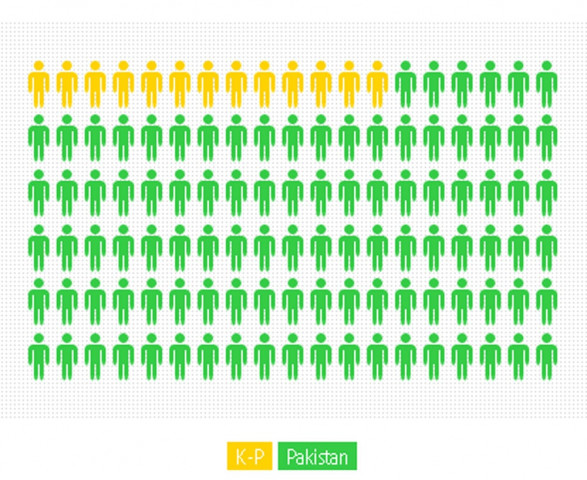Future planning: K-P conceives first population policy draft
Proposes inclusion of family planning in curriculum for higher secondary education.

Khyber Pakhtunkhwa (K-P has a population of 24 million according to the K-P Population Policy 2013. PHOTO: INFOGR.AM
A rigorous plan to reduce Khyber-Pakhtunkhwa’s (K-P) annual population growth rate from 2.05% to 1.8% by 2020 is one of the major aims highlighted in the first draft of the K-P Population Policy 2013.
The 20-page document available with The Express Tribune states the government plans to do this by focusing on a major sensitisation drive, particularly among the youth and women, by proposing the inclusion of family planning in the curriculum for higher secondary education and academic levels above it.

“In terms of population, K-P is the third largest province of the country with a population of 24 million,” states the draft. Furthermore, it directly relates an increase in population to poverty.
While the report makes little mention of internal migration – both forced and voluntary – of people from the Federally Administered Tribal Areas to settled areas, particularly the provincial capital, it does stress on the need for an innovative population redistribution policy. The policy aims to do this by establishing new towns and industrialised zones keeping in view massive internal migration expected in the next two decades.
A sizeable section of the draft shows a lot of effort will be put into directly making people aware of population control, or by introducing mechanisms which help reduce impediments to the understanding of the matter.

DESIGN: KIRAN SHAHID
Various strategies proposed in the document include involvement of religious leaders to tackle the issue of growing population, and the local manufacture of contraceptives for the lower strata of society.
While the defined strategies remain descriptive and goal-oriented, what is lacking is information on who and how the strategies would be implemented.
The policy also demands sustained political commitment, the government taking full ownership of the family planning programme, availability of resources through the National Finance Award, and mandatory provision of family planning services from the health department.

The policy’s short-term goals till 2020 include the increasing contraceptive prevalence rate from 28.1% to 37%, and decreasing fertility rate per woman from 3.9 to 3.3 births. Meanwhile, its long-term goals include an objective to increase the use of contraceptives from 28.1% to 50% by 2030, along with reducing fertility rate to 2.1 births per woman by 2035 and reducing population growth to 1.3% from the present 2.05%.
According to an official associated with the process of formulating the draft, an overall assessment of the document shows the policy needs to be revised. “It needs to be rationalised in the context of K-P as the goals and strategies are still very broad,” he opined.
The official further said the necessary changes will be made soon and at least two more drafts will made before a final policy draft is sent to the provincial cabinet for approval.
Population Welfare Department Director General (DG) Fazal Nabi told The Express Tribune the major issue at hand was the fact that population control is not taken seriously. The DG insisted the policy draft has a vision “but population and its dynamics is a multi-stakeholder process.”
Planning and policy for the population welfare programme has become a provincial subject after the 18th Amendment to the Constitution.
[infogram url="" height="550"]
Published in The Express Tribune, January 12th, 2014.













COMMENTS
Comments are moderated and generally will be posted if they are on-topic and not abusive.
For more information, please see our Comments FAQ